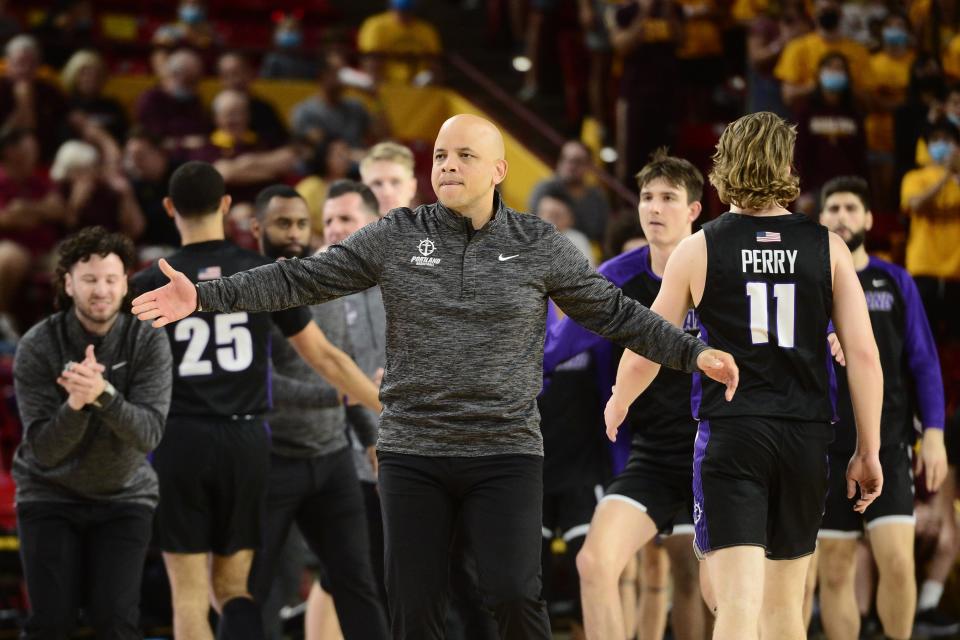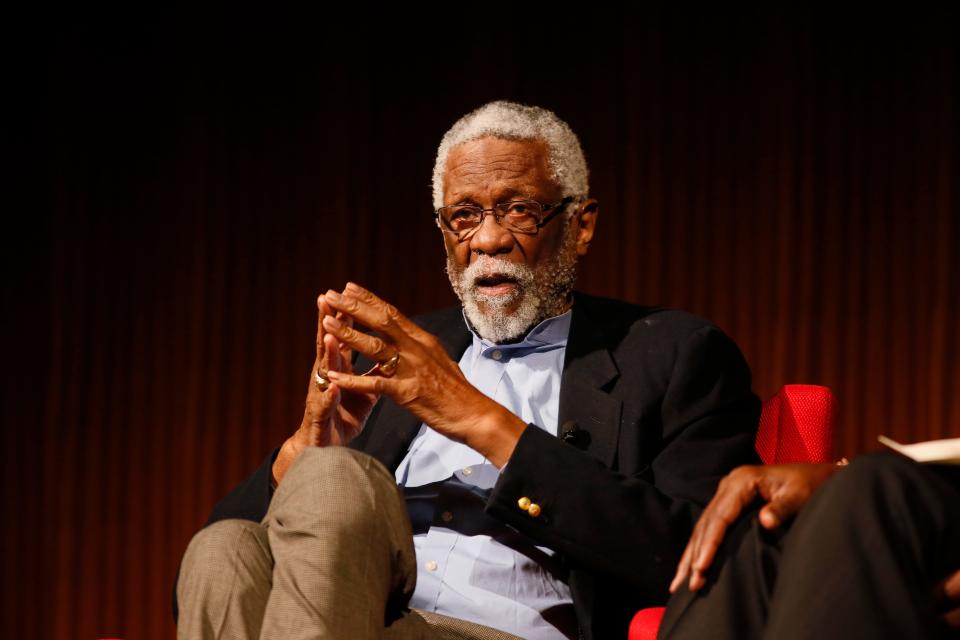West Coast Conference makes gains in minority hiring through advent of Russell Rule
When Gloria Nevarez took over as commissioner of the West Coast Conference in March 2018, the thought of name, image and likeness and its impact on college athletics was years away, conference realignment had cooled off and while racial inequality and policy brutality were discussed, almost no one was prepared for the changes coming.
Nevarez, who is one of just 10 female conference commissioners, says her immediate concern upon getting the job was keeping Gonzaga, with its powerhouse men’s basketball program, from straying to greener pastures and raising the league’s national profile. Nevarez, as it turned out, had nothing to be concerned about. Gonzaga passed on leaving for the Mountain West despite overtures from the league four years ago.
“I appreciate her reasons for thinking that way, but the West Coast Conference was the conference that we wanted to remain a part of was and going to best serve our needs and our interest as well,” Thayne McCulloh, president of Gonzaga, told USA TODAY Sports.
But then came May 25, 2020.
The murder of George Floyd by a Minneapolis police officer shocked the nation and forced millions into re-examining the landscape of equity across all facets of life, including in the workplace.
Less than three months after Floyd’s death, the WCC created the Russell Rule, named for Bill Russell, a Naismith Basketball Hall of Famer who led conference member San Francisco to two men's national championships in 1955 and 1956.
The rule requires schools in the conference with open head and assistant coaches’ jobs, plus senior administrative positions, including athletics directors, to interview at least one qualified minority candidate.
The first-year results were immediate, signaling movement in a positive direction.
“The first year of hiring (for the WCC) was extraordinary, in terms of the impact it had,” Richard Lapchick, the director of University of Central Florida's Institute for Diversity and Ethics in Sport, said. “More than 50% people of the people hired were people of color.”
For the WCC, the latest report, which encompasses data from Aug. 1, 2020 to July 31, 2021, determined that of the 84 people hired during the time period, half were from underrepresented communities, with 96 percent meeting the rule’s hiring commitment. The candidate pool included 135 candidates from traditionally underrepresented communities, including nine hires for head coaching positions.

Nevarez, the first Latin-American to become commissioner of an NCAA conference, asked Lapchick to produce a report on how well the WCC is doing in the diversity, equality and inclusion space after Floyd's death.
Lapchick and his team publish the Racial & Gender Report Card annually to assess how prevalent professional and college leagues are hiring minorities and women.
Lapchick was one of the people in 2001 along with civil rights attorney Cyrus Mehri and famed lawyer Johnnie Cochran, who threatened legal action against the National Football League if it didn’t improve its hiring practices.
The Rooney Rule was adopted two years later and has been tweaked numerous times over the past two decades, with varying degrees of success and skepticism. While nearly 70 percent of the players are Black, at the beginning of the 2022 season, there are only five minority head coaches.
The Russell Rule impact
When Lapchick reported his findings, he said the WCC matched other conferences in their hiring practices of minorities.
REPORT CARD: Tracking the WCC diversity hiring commitment
The issue the NFL has had for decades is the same in major college football and basketball, where most of the participants are athletes of color and coaches are overwhelmingly white.
“I think it was typical of small conferences, where there was underrepresentation of black coaches and head coaches in the league, underrepresentation of black athletic directors, the whole hierarchy of the department. It wasn’t egregiously different than a lot of other conferences who are going through the same thing,” Lapchick said.

Nevarez immediately set out on a fact-finding mission to gauge the league’s presidents - all of whom are white - and senior administrators interest in creating a policy to address workplace racial inequality and hiring practices.
BYU athletics director Tom Holmoe was on board with creating a policy and using his experience as a player and assistant coach with the San Francisco 49ers to make sure that the implementation of any rule was not just a rubber stamp.
Holmoe saw first-hand through the Bill Walsh Diversity Fellowship Program, which started in 1987 and gave young black coaches at all levels of football a chance to get their foot in the door, the benefits of increasing the talent pool.
“I know how it works. I know that people like to hire people that they’re friends with and a lot of the black coaches just didn’t have that opportunity,” Holmoe said. "You have to create a pipeline or it’s not going to change. And I want it to change.”
A 'positive impact'
McCulloh, who has been Gonzaga’s president since 2010 and its first non-Jesuit leader, said part of the challenge was trying to take 10 institutions with diverse student bodies and surrounding communities to recognize they were all starting at different places when it came to DEI.
Some of the other had to do with what that particular school’s focus was, whether it was improvement of athletics, academic, or infrastructure.
“It’s easy to say a lot of words, but we are action-oriented people and we wanted to advance and create opportunities for our students, our student athletes, our communities and frankly for leaders in this space,” McCulloh said. “We have a long history that when something gets adopted, it is understood by the membership that it becomes our practice.”
Half of the assistant coaches of the men’s and women’s basketball teams come from underrepresented communities, which is more than 10 points above the national average.
The Census Bureau defines underrepresented communities as “Black, Latino, and Indigenous and Native American persons, Asian Americans and Pacific Islanders and other persons of color; members of religious minorities; lesbian, gay, bisexual, transgender, and queer (LGBTQ+) persons; persons with disabilities; persons who live in rural areas; and persons otherwise adversely affected by persistent poverty or inequality.”
“It is so exciting to see the positive impact the Russell Rule has had in the West Coast Conference. Providing opportunities to traditionally underrepresented communities in college athletics is essential to create more diverse and inclusive institutions,” Bill Russell and his wife Jeannine said in a statement to USA TODAY Sports. “It’s great to see this rule making a measurable change for all members of the WCC and it is my honor to be its namesake. It is my hope that other conferences will follow the lead of the WCC and create a similar rule to make a positive impact on the culture of collegiate athletics."
Adjusting to the rule
Nevarez says she and the conference’s Council of Presidents have discussed dealing out punishment to schools who aren’t doing the right thing.
Warnings, public reprimands and fines are on the table as potential sanctions for extreme circumstances and are aligned with the conference’s handbook.
Nevarez doesn’t think that schools will slip through the cracks because of the first-year data and wants sustainability to be the focus moving forward.
“The goal is not to embarrass; the goal is to have accountability,” Nevarez said. “I think we struck a good balance. I was nervous, year one. … We box outside of our weight class. Just running athletics on a daily basis is a tough thing. We don’t have legions of people like the Power 5 do.”
The data that is shared is public information, as the league’s athletics directors provide a report detailing how they conducted their job searches with the results circulated at the league meetings.
Holmoe says the spirit of the Russell Rule is to engage, but the principle is to hire the best candidate for the position.
“People have to start somewhere and if you’re afraid because of where you’ve been and that you’re not going to do anything, you’re going backward and still back pedaling,” Holmoe said.
BYU’s time in the WCC is coming to an end as it is headed to the Big 12 Conference in July 2023, and its leadership wants to carry forth its success. Each of their eight hires, according to the Racial and Gender Report Card, met the Russell Rule’s hiring commitment.
The Big 12 doesn’t have a rule mandating hires in staff or coaching but Holmoe hopes he can take what he has learned and apply to their new league members.
“We should have to live up to the Russell Rule without it even being there,” Holmoe said. “It’s a beautiful thing. But if you start bringing in minority candidates and keep bringing them in and never hire them, then you have an issue.”
Pipeline for women
Like the other conferences, there is a glaring lack of females in high level jobs and as coaches of men in all three NCAA divisions.
Of the 130 FBS athletics directors, only 13 are women. There are no female assistants for a WCC men’s basketball program. Out of 2,577 coaches on staff in men’s basketball programs in 2020-21, there were a total of eight women coaching men in all three NCAA divisions.
Nevarez called those stats “appalling” and hopes other leagues look at the WCC as leaders in this new DEI world.
“I think this policy just forces folks who are otherwise maybe understaffed, might hit the “easy” button on a hire to take a little bit more time and take a deep breath and really work on diversifying the pool,” Nevarez said.
For Aarika Hughes, the head women’s basketball coach at Loyola Marymount, the Russell Rule is overdue.
Hughes played at Southern California and coached Amateur Athletic Union teams in her native Oregon before working under Mark Trakh, who coached her at USC. She spent five seasons at New Mexico State with Trakh and one at New Mexico before returning to the Women of Troy for four years as an assistant.
Now 34, Hughes is using her position and platform to strive for change.
Hughes points out that mentorship is key and implores decision makers at the highest levels to not only think outside of the box, but to seriously take the time to study the issues that have plagued college athletics and the professional ranks for years.
“What does it look like for someone to be just a coach? Why does it have to be female, why does it have to be male? I think it’s all of our hopes that we are not going to have these questions about if you’re struggling,” Hughes said. “You shouldn’t be struggling. You should have just as much of a seat at the table and opportunity. It’s our job to challenge student-athletes and people who are looking to get into those seats and are willing to be vulnerable.”
So, is the Russell Rule working? The data suggest it is, but Nevarez said there is one thing that talented individuals can do to make sure it does work.
“Apply,” she said. “You will get a real shot if you apply in the WCC. That makes a difference in our schools being able to attract and market jobs and positions. Once you are in, and it’s hard to get in, and prove yourself, the opportunities start to come.”
This article originally appeared on USA TODAY: Bill Russell Rule helps West Coast Conference advance minority hiring

